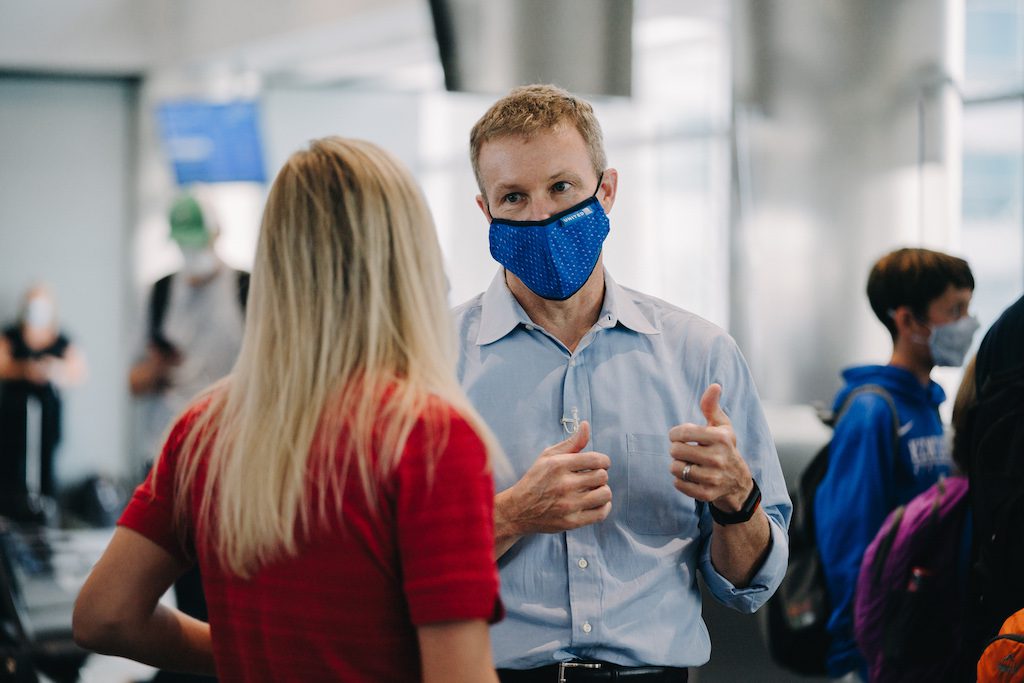United CEO Vows to Beat Margin-Leader Delta on Quality not Quantity

Skift Take
Any longtime United Airlines flyer will know quality has not always been the airline's strong suit. Things went decidedly downhill, both onboard and operationally, after the carrier merged with Continental Airlines in 2010 and really only began to recover after former CEO Oscar Munoz took the helm in 2015.
Scott Kirby, Munoz's right-hand man until he took over as CEO in 2020, is changing that narrative. While costs remain of high importance to the famously penny-pinching manager, those cuts will not come at the expense of improving the passenger experience. In fact, United has embarked on a major investment program to improve the onboard experience for travelers and, Kirby hopes, get the airline to higher margins than long-time U.S. leader Delta Air Lines.
"We will win customers on quality," Kirby said at the Skift Aviation Forum on Wednesday. And he had plenty of examples quality improvements to cite: The addition of premium-heavy "high-J" Boeing 767-300ERs that fly to Europe, the Bombardier CRJ-550 that met pilot contract rules while bringing a dual-class product to smaller cities, and a return of in-seat entertainment screens to its domestic mainline narrow-body fleet to name a few. And, while further out, United is investing in new spaces in Denver and Newark, and possibly in Washington, D.C.
These improvements coupled with United's seven hubs located in many of the U.S.'s largest markets give the airline the "structural ability" to be the "leading margin airline," said Kirby. This is a competitive shot over the bow of Delta that, prior to the Covid-19 pandemic, was the major carrier with the highest margin in the U.S. market. Delta generated an earnings before interest and taxes (EBIT) margin of 14 percent in 2019 compared to 10.6 percent at United and 8.5 percent at American Airlines, according to data from S&P Capital IQ.
In October, Delta Chief Financial Officer Dan Janki said the airline is focused on "prioritizing driving margins, profitability and restoring our balance sheet" in 2022. It will do this through the continuation of many of the programs it began before the Covid-19 pandemic: Replacing smaller regional jets with new larger, more efficient aircraft; Updating aircraft cabins with additional premium seats; and accelerating investments in its hub airports. Delta plans to release more details of its 2022 plans at an investor event in December.
"There's room for both of us to do really well," said Kirby on United's competition with Delta. "[But] I think we will win. We've just got a better hand of cards." By "cards," Kirby referred to what he sees as United's better located hubs.
Kirby's embrace of quality is new for the long-time airline executive. At America West Airlines and US Airways he was known for an obsessive focus on keeping costs down and maximizing revenue. Similarly, at American, where he was president under CEO Doug Parker from 2013 until 2016, he backed the decision to remove in-seat TV screens from narrow-body aircraft.
“I always had a boss before," he said when asked about his apparent change of heart. "I have definitely evolved, as I’ve seen how customer service and product matter. But as the hand has changed, it’s given me the chance to really focus on it.”
American now stands alone among the U.S. Big 3 airlines without — and no plans to add — seatback screens to its narrow-body jets. United unveiled plans to install them across its fleet, beginning with new Boeing 737 Max aircraft, in June. Delta never opted to remove such screens in the first place and offers them on nearly all of its mainline jets.
But ultimately numbers will determine success or failure for Kirby. Onboard product improvements are not cheap to install or operate — any added weight increases fuel burn. They must, eventually, be justified by higher fares, or passenger "yields" in airline parlance. The pandemic has given Kirby some breathing room on this as few — if anyone — in the industry are looking for profits or record margins from United for some years to come.
Investors will eventually want to see a return on these investments. And that may be shareholders returns or, just maybe, beating Delta in the margin game.




